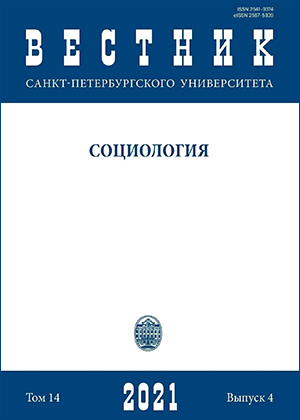Коронавирус бросает вызов современному антропоцентризму
DOI:
https://doi.org/10.21638/spbu12.2021.402Аннотация
В статье обосновывается, что пандемия коронавируса разрушает современные антропоцентрические рамки. Она открывает перед исследователями, политиками, практиками новую, пост-антропоцентрическую перспективу, которая смещает человека из центра бытия и предлагает трактовку человеческого существования в связке с другими, «нечеловеческими», такими как планета, окружающая среда, животные или технологии. Однако в этот критический момент, вместо того чтобы рассматривать пандемический кризис как сигнал к пробуждению для смещения фокуса с антропоцентрической на пост-антропоцентрическую перспективу, доминирующие способы понимания кризиса в общественном дискурсе продолжают формулировать его в антропоцентрических терминах. Автор на основе анализа кейса первой волны пандемии в Греции с марта по июнь 2020 г. показывает, что, несмотря на то что общим в риторике СМИ, политиков и значительной части ученых является понимание различий и соответственно проведение разграничительной линии между человеком и «нечеловеком», между обществом и природой, тем не менее идеологически доминирующей остается позиция превосходства человека над окружающим его миром. В этом отношении постантропоцентрический вызов, брошенный пандемией коронавируса, кажется, отложен до дальнейшего рассмотрения. Таким образом, поскольку общество застряло на старом антропоцентрическом пути, один из фундаментальных вопросов XXI в., а именно хрупкие отношения человека с планетой Земля и другими биологическими видами, остается «черным ящиком», препятствующим принятию адекватных мер.
Ключевые слова:
COVID-19, пандемия коронавируса, современный антропоцентризм, постантропоцентризм, постгуманизм, коронавирусный общественный дискурс, постантропоцентрическая перспектива
Скачивания
Библиографические ссылки
References
Загрузки
Опубликован
Как цитировать
Выпуск
Раздел
Лицензия
Статьи журнала «Вестник Санкт-Петербургского университета. Социология» находятся в открытом доступе и распространяются в соответствии с условиями Лицензионного Договора с Санкт-Петербургским государственным университетом, который бесплатно предоставляет авторам неограниченное распространение и самостоятельное архивирование.




